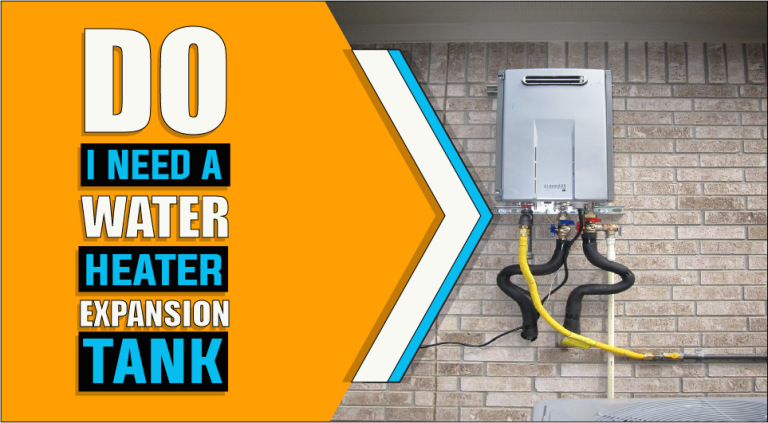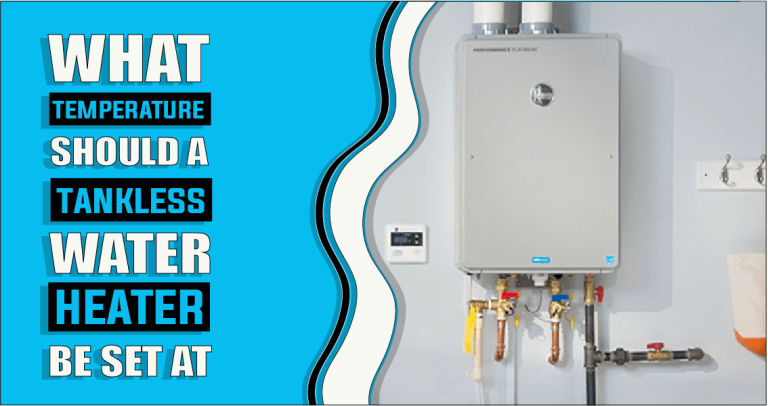What Is A Condensing Tankless Water Heater – The Truth Reveals
Do you ever wake up in the morning and wish that you could maximize your hot water supply? If so, then investing in a condensing tankless water heater may be the solution for you. This type of heater is quickly becoming a popular choice amongst those who desire to take full advantage of their hot water capabilities at home. Whether it’s outfitting your house with several showers or taking long baths, having access to an unlimited source of hot running water can make all the difference. In this blog post, we’ll go over what exactly makes condensing tankless heaters so appealing and how they can specifically benefit your lifestyle. Keep reading to learn more about what is a condensing tankless water heater, its common Factors, pros, and cons! So get ready, warm luxury awaits!

Let’s explore what is a condensing tankless water heater.
A condensing tankless water heater is a type of energy-efficient, high-efficiency appliance that heats water as it passes through a series of coils or heat exchangers. It differs from conventional tankless water heaters in that the condensing unit reclaims some of the energy lost during the heating process, resulting in more efficient operation and lower energy costs. Furthermore, condensing tankless water heaters can operate on an “on-demand” basis. This means that it instantly heats water as soon as you turn it on. As a result, you can enjoy the convenience of having hot running water without waiting for your heater to fill and warm up. These units reuse the additional heat and only release the vapor after it reaches about 38 degrees Celcius when it is no longer beneficial for the heating process.
Condensing tankless water heaters don’t need as much expensive venting material because their vapor is significantly colder. A typical PVC pipe is frequently employed because it can easily handle the heat and the corrosiveness of the vapor. Efficiency in the region of 98% is achieved because the condensing unit recycles and collects the leftover exhaust heat.
The condensation water is now collected inside the device, where the exhaust gases are also cooled. The condensing tankless water heater’s heat exchanger takes care of this and needs to be made of higher-quality, non-corrosive material to survive the corrosiveness. It is constructed from a material that is also used in venting tubes in non-condensing units. Additionally, the water from the condensed condensation must be neutralized before draining. A filtration system within the unit does this.
Summarily, condensing tankless water heaters are a smarter, more efficient choice as they offer an impressive 98% energy efficiency rate and use economical venting materials. And though the design itself is slightly pricier than traditional non-condensing models, these water heaters make up for it by not needing to rely on expensive stainless steel vents that only reach 80% efficiency ratings.
How a Condensing Tankless Water Heater Works
A condensing tankless water heater is an efficient and cost-saving way to provide hot water to your home. It works by taking cold water from the main line, heating it, and then sending it back out to your faucets. Understanding how this type of water heater works can help you make an educated decision when selecting a new water heater for your home.
- The tankless water heater notices the flow when a hot water faucet is opened. And the process begins with cold water entering the condensing tankless water heater from the main line.
- To establish how much hot water is required, the flow sensor activates.
- The igniter starts to work. For the proper gas supply, the gas control valve opens.
- The fan and venturi turn on to deliver the proper amount of fuel and gas.
- When the premix burner lights up, a flame is produced that heats the incoming cold water.
- The secondary heat exchanger pre-heats cold water. It works to capture the hot exhaust gases from the combustion process and then cool them down, resulting in condensation water which can be reused to heat more water.
- From the secondary to the primary heat exchanger, preheated water is transferred.
- The heater controls the flame to heat the water according to the outgoing set temperature. As the inlet temperature increases, so too do the outlet temperature, this is known as thermal transfer.
- Once heated up, the hot water travels through a heat exchanger located inside the unit which transfers energy from the hotter side to the cooler side. This process helps conserve energy and ensures that no heat goes to waste. The heat exchanger also captures any condensation created during the thermal transfer process and stores it until it can be safely discharged outside via a drain pipe or other designated outlet.
- After exiting through this pipe, hot potable water is ready for use! You can adjust both temperature and flow rate settings on your condensing tankless water heater according to your preferences or needs with built-in timers
All in all, condensing tankless water heaters are a great option if you’re looking for an efficient and cost-saving way to provide hot water to your home. With their impressive 98% efficiency rate and economical venting materials, condensing tankless water heaters are a smart choice when it comes to choosing a new water heater.
Benefits of Using a Condensing Tankless Water Heater
Enjoy the comfort of a virtually limitless supply of hot water with the added benefits that come from using a condensing tankless water heater. Save energy and money while also benefitting from its increased safety, space-saving design, longer lifespan, and easy installation!
1: Increased Efficiency and Lower Utility Bills
Using a condensing tankless water heater significantly increases efficiency when compared to traditional tank heaters. This results in energy savings for you, as well as lower monthly utility bills. These heaters have ultra-high thermal efficiencies from 81% to 97%, reducing energy costs. Additionally, this type of heater uses less fuel per hour than its non-condensing counterparts, resulting in further savings throughout the year.
2: Unlimited Hot Water Supply
One of the biggest benefits of installing a condensing tankless water heater is its ability to provide an unlimited supply of hot water without the need to wait for reheating after use. With a condensing tankless model, there is no need for waiting because it will instantly heat cold incoming water when needed, up to 8 gallons per minute! This allows you to enjoy instant hot showers or baths anytime you want without any interruption from needing to reheat your storage unit first.
3: Compact Design Allows for Flexible Placement in Your Home’s Layout
The compact design of these types of heaters makes them ideal for installation anywhere around your home layout, regardless of space restrictions or existing layout design limitations. Since these units are very small in size and weigh much less than traditional tanks, they can be mounted on walls or even placed in cabinets and closets, giving you much flexibility when it comes to designing your desired interior layout with no worries about whether or not you’ll be able to accommodate your chosen heating system properly.
4: Longer Lifespan
Aside from its efficiency benefits, another advantage offered by a condensing tankless model is its longer lifespan. These types of heaters have been designed specifically with durability in mind which means that they should last at least two times longer than standard models; some even claim an average life expectancy range between 5 to 20 years! This means that if properly maintained over their life span, users can expect their heater unit not only to save them money but also to last them much longer while providing quality performance throughout their lifetime!
Potential Drawbacks of Using a Condensing Tankless Water Heater
A condensing tankless water heater may provide many advantages, but there are also potential drawbacks to consider.
1: Initial Cost May Be Higher
The initial cost of a condensing tankless model may be higher than other traditional storage-tank models. However, this is to be expected as condensing tankless heaters are the most efficient water heating systems on the market and their upfront cost reflects that efficiency.
2: Installation Requirements May Necessitate Professional Assistance
For a condensing tankless water heater to operate at peak efficiency, it must be installed correctly and maintained regularly. This often requires assistance from a professional, who will inspect the unit and ensure that all necessary parts and components are in good working order. Depending on the complexity of your home’s layout, this process can become quite complicated and costly if done improperly or without an experienced professional overseeing it.
3: Ventilation Setup Can Be Complicated Depending On Your Home’s Layout
The setup of the ventilation system necessary for a condensing tankless water heater is also complicated by varying home layouts and construction materials used in homes today. This can make installation difficult even with professional help; as such, it is important to consult with an experienced installer before purchasing any condensing tankless water heater.
Overall, condensing tankless water heaters provide many advantages such as cost savings, an unlimited supply of hot water, and a longer life span. However, it is important to take into consideration the potential drawbacks associated with these models to be sure that you are making the right decision for your home’s needs before investing in one.
Factors to Consider When Choosing Condensing Tankless Water Heater for Your Home
When making the important decision of upgrading your home’s water heater, there are several factors to weigh. From size specifications and fuel considerations to maintenance requirements and energy costs, it pays to spend some time researching which condensing tankless model best suits you!
1: The size of your household:
Firstly, you should also look at the size of your household, if you have a larger family or frequently entertain large groups of people, then again you will likely require a unit with greater capacity to ensure everyone has hot water when they need it.
2: The number of bathrooms in your home:
Secondly, you should take into account the number of bathrooms in your home, as this will dictate the size and capacity of the unit required. If you have more than one bathroom, you may need to purchase a larger condensing tankless water heater that can keep up with the additional demand.
3: Your desired hot water temperature and flow rate:
In addition to this, it is important to consider both your desired hot water temperature and flow rate. Different models of condensing tankless water heaters offer different capabilities in this respect, so make sure that any model you are considering meets your specific requirements before making a purchase.
4: Your home’s layout and its existing plumbing system:
Another key factor to consider when choosing a condensing tankless water heater is the layout and existing plumbing system in your home. For the unit to be installed correctly and operate efficiently, it must be compatible with any existing piping already present within the house.
5: The cost of the condensing tankless water heater:
Lastly, the cost is always an important aspect when selecting a condensing tankless water heater; not only do prices vary between different models but installation costs can also be significant depending on whether additional components or labor are required.
Ultimately these factors must be weighed against each other when making a final decision about which unit is best suited to meet all of your needs and budget constraints.
Frequently Asked Questions
A condensing tankless water heater is distinguished from a non-condensing unit by its ability to condense and reuse the heat that is normally wasted in non-condensing models. This results in higher efficiency levels, lower energy costs, and greater hot water output.
Condensing is the process of condensing and reusing the heat that is normally wasted from non-condensing tankless water heaters. More heat is captured throughout this process, substantially enhancing effectiveness. Additionally, they have superior insulation, heat exchangers, and more efficient burners.
While condensing tankless water heaters tend to cost more upfront than non-condensing models, the long-term savings in energy costs and improved efficiency make them worth the investment. In addition, they are less prone to corrosion, require less maintenance over time due to their superior construction, and generally have a longer lifespan.
The average cost of condensing tankless water heaters can range from $1,000 to $3,000 depending on size and fuel type. Installation costs for these units can also vary significantly and may require additional components or labor depending on the home’s existing plumbing system.
Some of the main advantages include cost savings, an unlimited supply of hot water, and a longer life span. Additionally condensing tankless water heaters are more efficient than other models, require less space for installation, and can be connected to existing plumbing systems with relative ease.
Conclusion
I hope you enjoyed this article on what is a condensing tankless water heater. A condensing tankless water heater is a type of water heating system that uses condensation and superior insulation to capture heat energy normally lost in traditional non-condensing models. This process makes condensing tankless water heaters much more efficient than other types while offering an unlimited supply of hot water and requiring less space for installation. When selecting one, it’s important to consider factors such as desired temperature and flow rate, the home’s existing plumbing system layout, the cost of the unit, as well as its associated installation costs. With some careful consideration, you can find the perfect condensing tankless water heater to meet your needs. This content provides an overview of condensing tankless water heaters, how they work, the various factors to consider when purchasing one, and what makes them worth the investment. Armed with this knowledge, you’ll be able to confidently make an informed decision about which condensing tankless water heater is best suited for your home.
Ella John is passionate about helping her readers make the best choice when purchasing a heater. She understands that selecting a heater can be difficult and strives to provide information to help make the decision easier. Ella’s website, Heatersinfo.com, provides valuable insight into heating trends and types of heaters and tips on how to care for them. She also advises selecting the right heater based on individual needs and preferences. Her expertise in electronics makes her an excellent source of knowledge, and she is confident that anyone who visits her website will find the perfect heater information for their needs. Ella’s dedication to helping others make educated decisions about buying the right heater is unparalleled, and she hopes to continue offering her expertise for many years. With Ella’s help, finding the perfect heater can be a breeze!





